Health
BYU women's basketball guard injures ACL twice
Many people look up to athletes, but people hardly talk about the challenges they go through. Arielle Mackey-Williams tells her story of how her injury impacted her life and mental health. “There’s been a lot of nights where I’m at home trying to go to sleep and I’m just crying myself to sleep because it […]
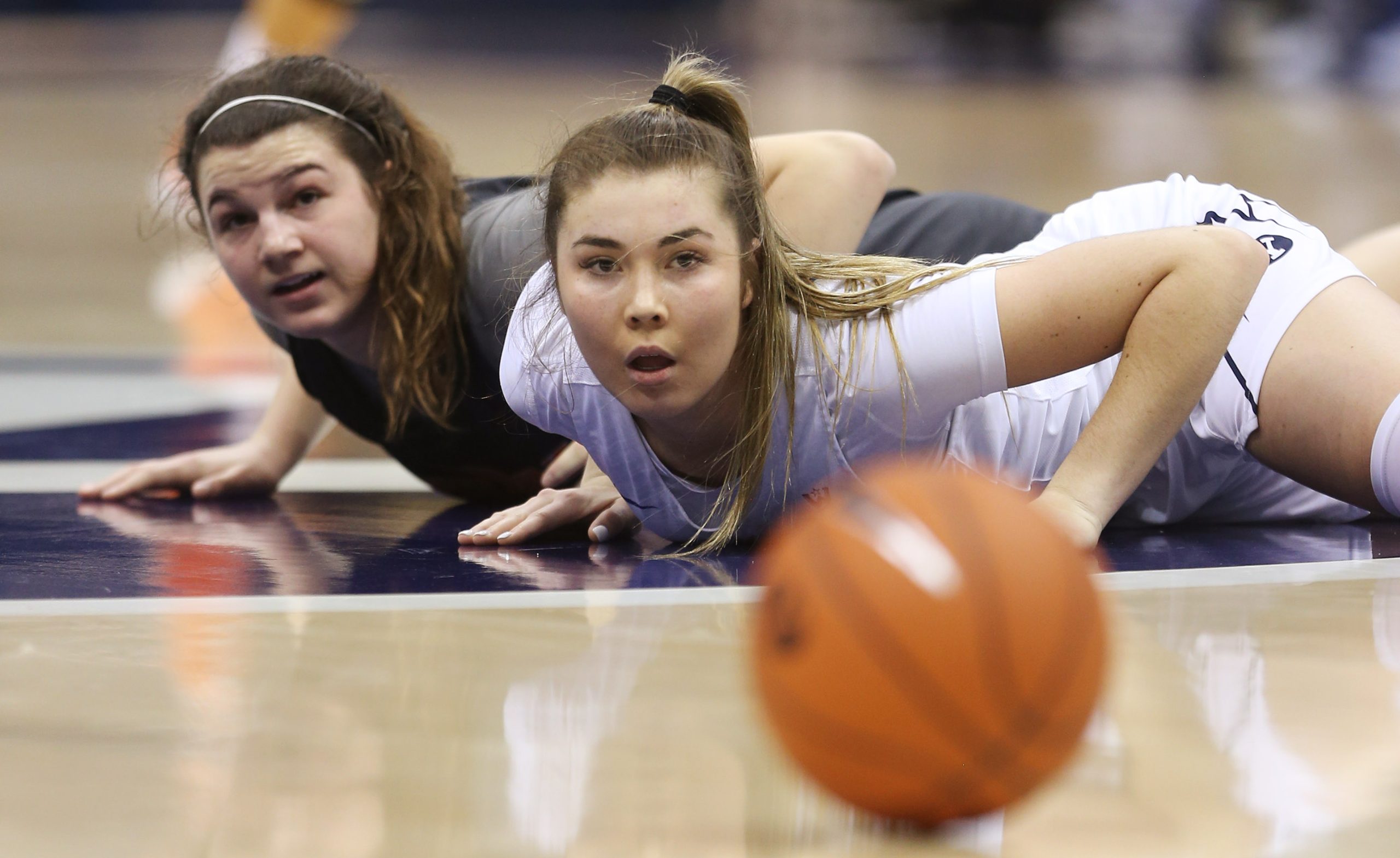

Many people look up to athletes, but people hardly talk about the challenges they go through.
Arielle Mackey-Williams tells her story of how her injury impacted her life and mental health.
“There’s been a lot of nights where I’m at home trying to go to sleep and I’m just crying myself to sleep because it just really hurts,” Mackey-Williams said.
10% of college athletes experience severe injuries according to the national athletic trainers association.
This is the second time that BYU women’s basketball player Arielle Mackey-Williams has injured her ACL. It has kept her from playing in another season.
“My first ACL injury, I went in to do a backdoor cut and my leg went inwards,” Mackey Williams-said. “The second time I definitely knew I tore my ACL again.”
Mackey-Williams said that staying positive has been more challenging during her second injury.
Newly-named BYU women’s basketball head coach Lee Cummard said he saw the mental toll the injury took on Mackey-Williams.
“On the court, Ari is a fierce competitor,” Cummard said. “The second time around, you can see it wearing on her a little bit more.”
Others close to her, including her mother and former coach, Mary Dawn described her firsthand experience.
“The hardest thing was, I couldn’t simply hug her and let her cry out loud and embrace that pain,” Dawn said.
BYU’s assistant athletic director of clinical mental health, Holly Binks, said athletes face tough challenges physically and mentally when they are dealing with an injury.
“There has to be almost a mourning period where they have to have grief, because they’ve had like a loss of like dreams of playing,“ Binks said.
Binks said that injuries are more than just a physical setback, they can impact scholarships and grades.
Binks and Cummard said that the sports culture is evolving to include a greater focus on mental health.
“Having a optimistic but a real point of view of where they’re at will really help,” Cummard said.
Dawn offered advice on how parents of athletes can support their mental health.
“Be a source of emotional support,” Dawn said. “Validate the feelings and remind them it’s okay to feel upset.”
Mackey-Williams said she has grown throughout her mental health journey.
“I think my injuries helped me just to be more grateful for knowing not only just basketball, but just the little things in life,” Mackey-Williams said.
Mackey-Williams said she has been able to maintain her mental health through this challenge while finding joy in the little things in life.
Health
Sports psychiatrist explains effect of heckling following incident involving Ketel Marte
PHOENIX (AZFamily) — Earlier this week, Arizona Diamondbacks star Ketel Marte was brought to tears by a heckler who reportedly made comments about his late mother during the team’s game against the Chicago White Sox. According to MLB.com, the spectator made a derogatory remark about Marte’s mother, who passed away in a car accident in […]


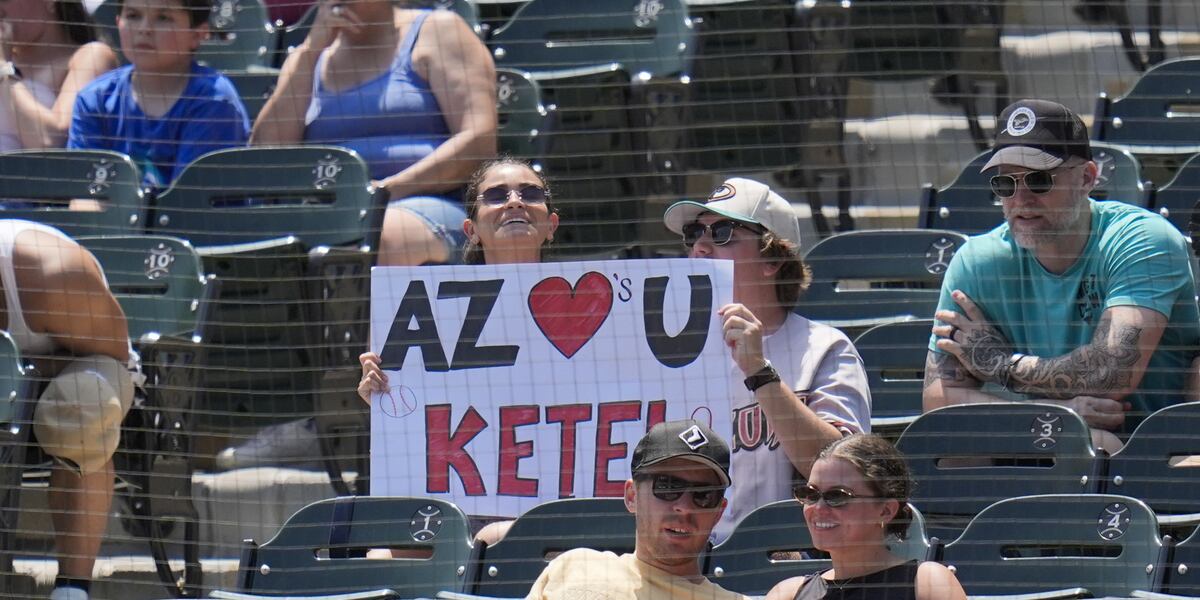
PHOENIX (AZFamily) — Earlier this week, Arizona Diamondbacks star Ketel Marte was brought to tears by a heckler who reportedly made comments about his late mother during the team’s game against the Chicago White Sox.
According to MLB.com, the spectator made a derogatory remark about Marte’s mother, who passed away in a car accident in 2017.
Arizona’s Family spoke to sports psychiatrist Brook Choulet, M.D., about the effects inappropriate comments have on athletes’ mental health. She says this incident is a reminder that athletes are people, too, while viewers may sometimes see them just as performers.
“Because we’re watching them on TV, you forget and you lose touch that they go through a lot of the same things that we go through, stress, anxiety, family challenges. So to see this is such a human display of that person behind the sport,” she said.
D-backs manager Torey Lovullo consoled Marte after the fans’ outburst. Choulet explained this culture shift between coaches and players in today’s game versus years past.
“Before, it’s like suck it up, you know, just move on, focus on next play mentality, and now we’re really seeing coaches treating them as humans, too, beyond their sport,” she explained. “That’s the biggest thing I talk to athletes about is their identity is often tied to their sport. So when we can separate that athlete from the sport and see them and treat them as a person, I love to see that.”
Following the incident, many have shown support for the Diamondbacks and Marte, including the White Sox displaying a sign that read, “Baseball is family. The White Sox community supports Ketel Marte.”
Officials confirmed the heckler was banned from all Major League Baseball stadiums.
See a spelling or grammatical error in our story? Please click here to report it.
Do you have a photo or video of a breaking news story? Send it to us here with a brief description.
Copyright 2025 KTVK/KPHO. All rights reserved.
Health
California violated Title IX in transgender athlete clash, Education Department says
WASHINGTON — The Trump administration has found that the California Department of Education and the state’s high school sports federation violated civil rights law by allowing transgender girls to compete on girls sports teams. The federal Education Department announced the finding Wednesday and proposed a resolution that would require California to bar transgender women from women’s sports and strip […]



WASHINGTON — The Trump administration has found that the California Department of Education and the state’s high school sports federation violated civil rights law by allowing transgender girls to compete on girls sports teams.
The federal Education Department announced the finding Wednesday and proposed a resolution that would require California to bar transgender women from women’s sports and strip transgender athletes of records, titles and awards. It’s the latest escalation in the Republican administration’s effort to bar transgender athletes from women’s sports teams nationwide.
If California rejects the proposal, the Education Department could move to terminate the state’s federal education funding.
“The Trump Administration will relentlessly enforce Title IX protections for women and girls, and our findings today make clear that California has failed to adhere to its obligations under federal law,” Education Secretary Linda McMahon said. “The state must swiftly come into compliance with Title IX or face the consequences that follow.”
Title IX is a 1972 law forbidding sex discrimination based in education.
California education and sports officials did not immediately respond to requests for comment Wednesday.
Federal officials opened an investigation into the California Interscholastic Federation in February after the organization said it would abide by a state law allowing athletes to compete on teams consistent with their gender identity. That followed an executive order signed by President Donald Trump that was intended to ban transgender athletes from participating in girls and women’s sports.
In April, McMahon’s department opened an investigation into the California Department of Education over the same issue.
Both investigations concluded that state policies violated Title IX. The administration has been invoking the law in its campaign against transgender athletes, launching scores of investigations into schools, colleges and states. It’s a reversal from the Biden administration, which attempted to expand Title IX to provide protections for transgender students. A federal judge struck down the expansion before Trump took office in January.
The administration’s proposed resolution would require California to notify schools that transgender athletes should be barred from girls athletic teams and that all schools must “adopt biology-based definitions of the words ‘male’ and ‘female.’ ” The state also would have to notify schools that any conflicting interpretation of state law would be considered a violation of Title IX.
Athletes who lost awards, titles or records to transgender athletes would have their honors restored under the proposal, and the state would be required to send personal apology letters to those athletes.
A similar resolution was offered to Maine’s education agency in a separate clash with the administration over transgender athletes. Maine rejected the proposal in April, prompting a Justice Department lawsuit seeking to terminate the state’s federal education funding.
Under federal guidelines, California’s education office and the sports federation have 10 days to come into compliance or risk enforcement action.
The federation separately tested a pilot policy at a state track meet in May, allowing one extra competitor in three events featuring high school junior AB Hernandez, who is transgender. The organization announced the change after Trump took to social medial to criticize Hernandez’s participation. The Justice Department said it would investigate Hernandez’s district and the state to determine whether Title IX was being violated.
The Associated Press’ education coverage receives financial support from multiple private foundations. AP is solely responsible for all content. Find AP’s standards for working with philanthropies, a list of supporters and funded coverage areas at AP.org.
Health
Florida assault survivor shares hope for change with new mental health law
Governor Ron DeSantis signed Senate Bill 168, the Tristin Murphy Act to tackle mental health issues and prevent crime. JACKSONVILLE, Fla. — A new law signed today by governor Ron Desantis is aimed at tackling mental health issues and preventing crime. Senate Bill 168, also known as the Tristin Murphy Act, will provide counties with […]


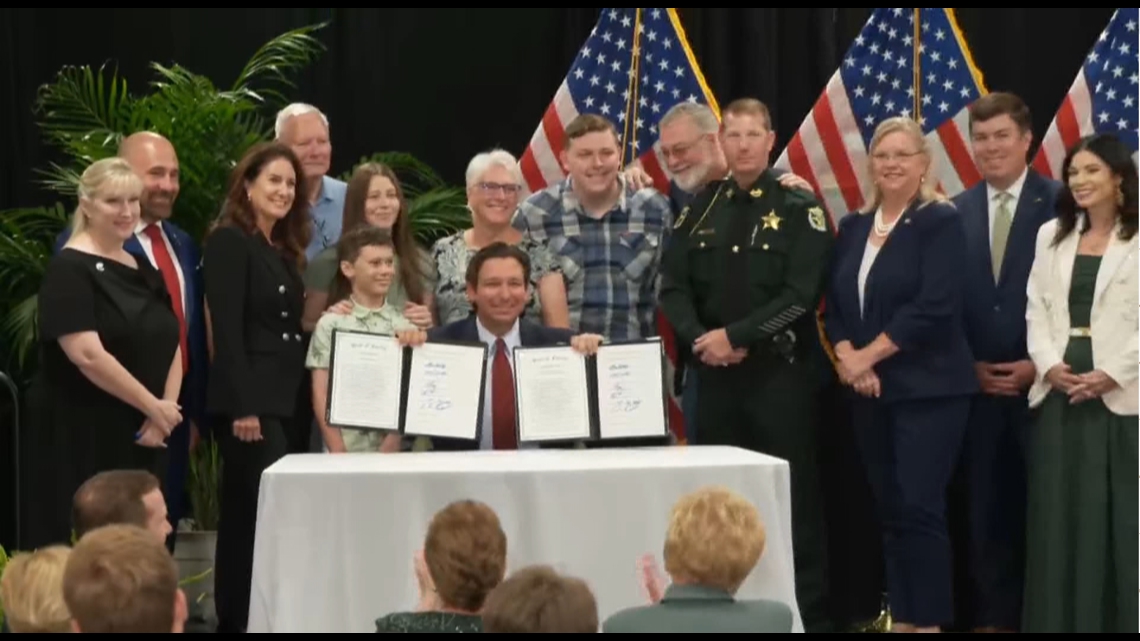
Governor Ron DeSantis signed Senate Bill 168, the Tristin Murphy Act to tackle mental health issues and prevent crime.
JACKSONVILLE, Fla. — A new law signed today by governor Ron Desantis is aimed at tackling mental health issues and preventing crime.
Senate Bill 168, also known as the Tristin Murphy Act, will provide counties with the resources to create mental health programs for certain offenders, instead of sending them straight to jail.
First Coast News first introduced you to a woman, who is asking to not be identified for safety reasons, back in May.
“It’s one of those scenarios that you never think would happen to you,” she said.
She and her friend were attacked by a man while walking along the Southbank Riverwalk near the friendship fountain.
The man was arrested and police identified him as Talmadge Billingslea Jr. He has a long history of stalking, violence and making racially motivated statements.
The women shared their story in hopes of getting Billingslea and other offenders help.
“He needs mental help and until you solve the base problem, jail is not going to do anything. It doesn’t seem like a solution to me,” the woman said.
Florida lawmakers are now trying to solve this problem.
On Wednesday, the Governor signed Senate bill 168, the Tristin Murphy Act, which allows counties to establish misdemeanor mental health programs and pretrial felony programs to prevent people who are mentally ill from being incarcerated.
“We don’t think putting them in jail is always going to fix those problems, and people need to be held accountable, but you also need to provide support that will address the problem,” said Governor Desantis.
The bill will also require emergency responder training and mental health evaluations for people with a history of incompetency before they are released on probation and return to society.
“I’m hoping that the bill helps them get the help they need and gets off the streets eventually and maybe into getting a job and living on their own. It’s a start and I think that’s great,” said one victim.
Talmadge Billingslea Jr. is still behind bars with a bond set at $19,000.
He makes his next court appearance on July 8.
Health
McDonald named volleyball assistant coach
Story Links SLIPPERY ROCK, Pa. – Raquel McDonald will join the Slippery Rock University volleyball program as an assistant coach, head coach Dylan Lasher announced Wednesday. “We’re very excited to have Raquel join our program,” said Lasher. “She will bring a great deal of energy, work ethic and commitment to SRU. Raquel’s passion, successful playing career […]

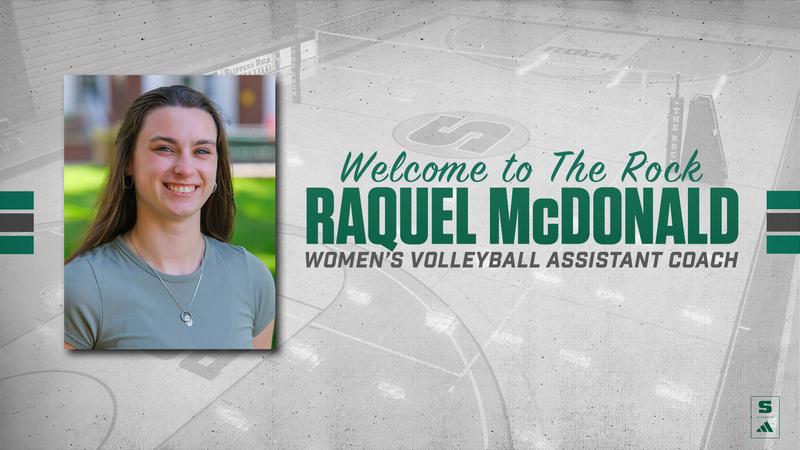
SLIPPERY ROCK, Pa. – Raquel McDonald will join the Slippery Rock University volleyball program as an assistant coach, head coach Dylan Lasher announced Wednesday.
“We’re very excited to have Raquel join our program,” said Lasher. “She will bring a great deal of energy, work ethic and commitment to SRU. Raquel’s passion, successful playing career and coaching ability will be extremely beneficial to our players, staff and community.”
McDonald comes to The Rock after spending two successful seasons on Lasher’s staff at Thiel College.
“I’m looking forward to starting this new chapter at Slippery Rock University and am excited for the opportunity to grow, contribute, face challenges and work alongside a great team,” said McDonald. “Let’s get to work!”
During her time at Thiel, McDonald assisted in all facets of the volleyball program and helped Lasher turn around the Tomcats’ women’s team that after going just 3-22 in 2023 compiled an impressive 17-9 record in 2024.
The 2024 season not only marked the second-highest victory total inside the Thiel women’s program since 2012, The 14-win improvement from 2023 to 2024 was the second-best year-to-year improvement among all 419 NCAA Division III women’s volleyball programs last fall.
McDonald was also an assistant for the Thiel men’s program which concluded its 2025 season with a 22-7 record that included a perfect 12-0 showing in the Presidents’ Athletic Conference, a PAC Tournament championship and an NCAA Tournament berth.
Prior to embarking on her coaching career, McDonald was a standout middle blocker for Thiel from 2019-22. Over 95 career matches, McDonald totaled 208 blocks, 660 kills and a .247 attack percentage while being named an All-PAC honoree on three occasions in addition to earning a spot on the College Sports Communicators Academic All-America Team as a senior.
McDonald, who ranks second in Tomcat program history in career attack percentage and ninth in total blocks, graduated from Thiel with her bachelor’s in cognitive psychology, sociology and criminal justice while minoring in Spanish. She is currently finishing her master’s in special education from SRU.
Outside of volleyball, McDonald has served as a Behavioral Health Technician at George Junior Republic, taught Spanish at Kennedy Catholic High School and was the Director of Student Services at the William Penn Academy.
A native of Syracuse, New York, McDonald officially began her new role at SRU this week.
The Slippery Rock volleyball team opens its 2025 season 3 p.m. Sept. 3 against Elizabeth City State University at the Fairmont State Classic.
To stay up to date with all that happens at The Rock, follow our official Athletic Communication accounts on ‘X’ (formerly Twitter, @Rock_Athletics), Facebook (RockAthletics) and Instagram (RockAthletics).
Health
NCAA to consider allowing athletes, staff to bet on professional sports
The NCAA Division I Council will consider a proposal to allow athletes and staff to wager on professional sports, the organization announced Tuesday. Interestingly, the change would only go into effect if Division II and Division III also vote to lift their prohibitions on professional sports gambling, which will take place next month. All rules regarding […]
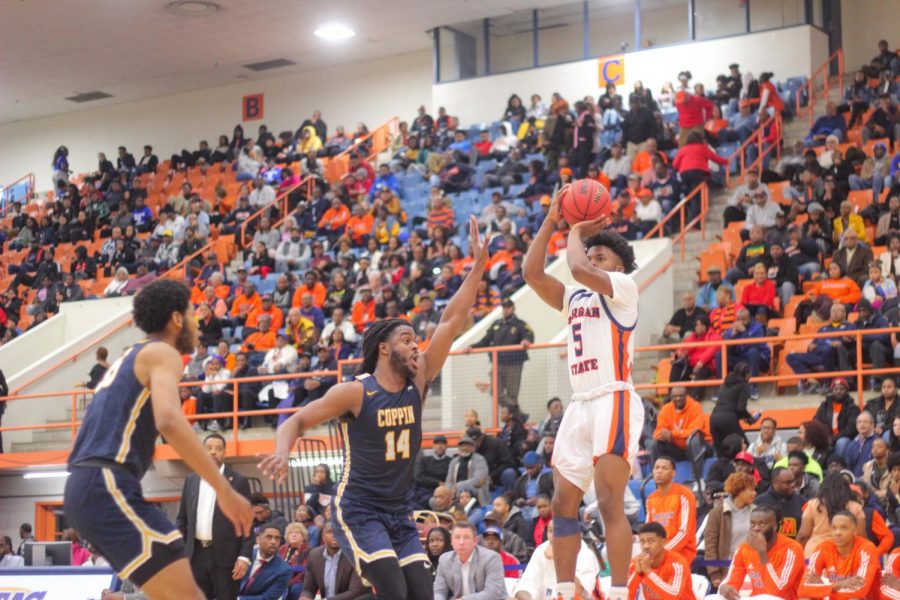

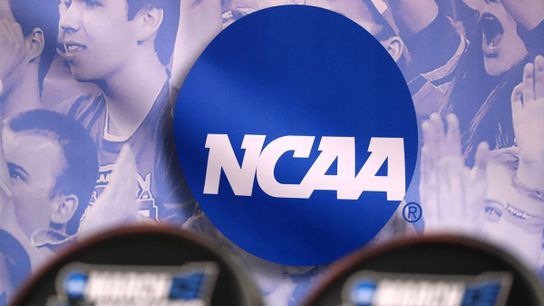
The NCAA Division I Council will consider a proposal to allow athletes and staff to wager on professional sports, the organization announced Tuesday. Interestingly, the change would only go into effect if Division II and Division III also vote to lift their prohibitions on professional sports gambling, which will take place next month. All rules regarding betting on college sports will remain in place.
The reasons for this possible rules change are several, all of them interesting:
— There’s a general fatigue around enforcing gambling rules considering how wide-spread sports betting has become in American culture ever since the Supreme Court overturned the federal ban on sports wagering in 2018. Thirty-nine states now allow sports betting, and it’s become a common pastime among young people (more on this below), and generally there’s a feeling that the NCAA and its members are wasting their time prosecuting college golfers for putting $100 worth of action on a Monday Night Football game.
“NCAA rules prohibiting sports betting at all levels were written and adopted at a time when sports gambling was largely illegal nationwide,” NCAA DI Council chairman and Illinois AD Josh Whitman said.
— There’s also a feeling that punishing sports betting may actually be making a serious problem worse. As Pat Forde wrote for Sports Illustrated earlier this week:
Toward that end, campus athletic mental-health practitioners have been given more information to treat problem gambling in a manner similar to other addictive behaviors. The hope is that gambling addicts would be more willing to admit a wagering problem and seek help if they weren’t afraid of losing eligibility for betting on pro sports.
“One of the big things that’s not really being tracked is gambling as a mental-health issue,” one source says. “We should be helping people instead of whacking them with ineligibility.”
“Throughout our discussions, the council has remained focused on student-athlete wellness and educating student-athletes about the risks and potentially harmful impacts of betting,” Whitman said.
In September, Fairleigh Dickinson University published a survey that found 10 percent of young men exhibited behavior consistent with a gambling addiction, more than three times the national average. “By meeting student-athletes where they are, schools may be more effective at preventing, identifying and supporting student-athletes with problematic gambling behaviors. Regardless of the change, schools are encouraged to use the many sports betting resources already available,” NCAA chief medical officer Dr. Deena Casiero said.
— Unspoken by the NCAA, but money is also undoubtedly a factor. Every athletics department in the country is looking for new revenue streams right now, and the gambling industry has become an attractive option for many. Last week, Iowa State announced that Cyclone Sports Properties and its We Will Collective have reached a sponsorship agreement with Elite Casino Resorts. This is the same Iowa State (along with Iowa) that found itself in a major gambling scandal just two years ago. (Five current or former Cyclones football staffers collectively wagered more than $100,000 across 6,200 bets, and routinely wagered on Iowa State men’s and women’s basketball games — which would still be a violation of NCAA rules.)
Allowing their staff and players to bet on professional sports might make athletics departments feel less gross about taking a casino’s money.
— Sparked by the Iowa/Iowa State scandal, the NCAA reviewed its gambling policies and found they were more restrictive than other major sports organizations of similar stature.
— However, Forde reports that it’s not a guarantee that the ban will be lifted. Opponents have made the slippery-slope argument against lifting the prohibition, reasoning that normalizing betting on pro sports will make it more likely that staffers and athletes will then bet on college sports.
To that end, the NCAA has made it a major priority to lobby against allowing sports books to create prop bets around college athletes. In March, the NCAA touted that 18 states have banned athlete prop bets while launching its Don’t Be a Loser campaign in conjunction with the opening of the Division I basketball tournament.
NCAA president Charlie Baker says allowing prop bets risks the safety of both the athletes themselves and the integrity of the competitions.
“Go sit behind the bench at one of these conference tournaments and listen to the bettors, yell and scream at these kids about their performance,” Baker said in March. “‘You need to do better. I’m losing money on you.’ Or the stuff that shows up online which we track in our tournaments, which is way more vicious and brutal than that. It’s really, this is a problem.”
So, one faction of the D1 Council is uncomfortable with of knocking down the wall between the NCAA and such a risky activity like gambling.
“It’s been hotly debated,” one source told Forde. “This is not a slam dunk.”
Health
Amber Glenn discusses mental health journey on TODAY
Two-time U.S. figure skating champion Amber Glenn reflected on her mental health journey, starting with briefly stepping away from the sport in late 2015, in a TODAY interview that aired Tuesday. “I was in a very dark place,” Glenn said, referring to 2015 and noting she was diagnosed with anxiety, depression and an eating disorder. […]


Two-time U.S. figure skating champion Amber Glenn reflected on her mental health journey, starting with briefly stepping away from the sport in late 2015, in a TODAY interview that aired Tuesday.
“I was in a very dark place,” Glenn said, referring to 2015 and noting she was diagnosed with anxiety, depression and an eating disorder. “One of my friends contacted one of my parents, and I sought help. I’m so grateful for that.”
Glenn turned 16 years old during that time. She reflected for months and did step back on the ice.
“I had no idea (if I would go back to figure skating),” Glenn told TODAY. “I knew that there was no way I could go back to the way I was doing things. And eventually I got to a place where I was doing things in a healthy way, and I could speak about my struggles.”
In March 2016, while still on a break from competition, Glenn attended the World Championships women’s free skate in Boston.
She watched as American Ashley Wagner performed brilliantly, moving up from fourth place after the short program to earn a silver medal.
It was part inspiring and also part discouraging. Glenn didn’t believe at the time that she could ever reach that level.
“Growing up, I saw the top skaters as untouchable and as these people who didn’t have the same struggles that I was having at that age,” she said. “Eventually, I got a peek behind the curtain, and they were struggling in silence. After seeing that, I realized that it was more important for me to be honest about my journey than to try and act like everything was perfect.”
Eight years after that time away, Glenn won her first senior U.S. title in 2024, then repeated as champion this past January.
She also won this past December’s Grand Prix Final, the second-most prestigious annual international event after the World Championships.
Glenn is bidding to make the three-woman team for the 2026 Milan Cortina Olympics, which will be decided by a committee after this upcoming January’s U.S. Championships.
At 26, she can become the oldest U.S. women’s singles skater to compete in an Olympics in 98 years.
“Part of me is still in disbelief,” Glenn told TODAY. “I need to trust that I put in the work to be here and that I do deserve it.”
Amber Glenn reflected on long-ago memories of Jason Brown and Ashley Wagner, plus recent ones with a local school class.
-

 Motorsports2 weeks ago
Motorsports2 weeks agoNASCAR Weekend Preview: Autódromo Hermanos Rodríguez
-

 Motorsports2 weeks ago
Motorsports2 weeks agoNASCAR Through the Gears: Denny Hamlin has gas, a border needs crossing, and yes, that’s a Hemi
-

 High School Sports3 weeks ago
High School Sports3 weeks agoHighlights of the Tony Awards
-

 Health2 weeks ago
Health2 weeks agoGymnast MyKayla Skinner Claims Simone Biles 'Belittled and Ostracized' Her amid Riley …
-

 Motorsports2 weeks ago
Motorsports2 weeks agoNASCAR Race Today: Mexico City start times, schedule and how to watch live on TV
-

 Professional Sports3 weeks ago
Professional Sports3 weeks agoUFC 316
-

 Sports2 weeks ago
Sports2 weeks agoCoco Gauff, The World's Highest
-

 NIL2 weeks ago
NIL2 weeks agoTennessee law supersedes NCAA eligibility rule
-

 College Sports3 weeks ago
College Sports3 weeks agoFisk to discontinue history-making gymnastics program after 2026 | Area colleges
-
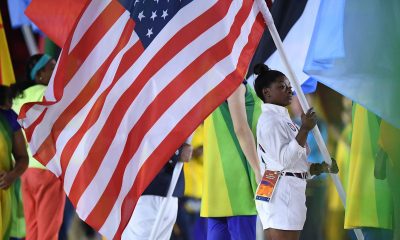
 Health3 weeks ago
Health3 weeks agoOlympic great Simone Biles shares mental health journey on first Hong Kong visit






































